Waterbury, Connecticut, Hgh State Clinic, Hgh Injections, Hrt Doctors
Waterbury, Connecticut Blood Testing Facilities
 Represents a LabCorp blood testing facility
Represents a LabCorp blood testing facility Represents a Quest Diagnostics blood testing facility
Represents a Quest Diagnostics blood testing facility

Nearby Labcorp Blood Testing facilities:
- Labcorp Center Distance: 0 m, 1068 W Main St, Waterbury, New Haven County, CT, 6708
- Labcorp Center Distance: 13 m, 3018 Dixwell Ave 3Rd Fl, Hamden, New Haven County, CT, 6518
- Labcorp Center Distance: 19 m, 755 Campbell Ave Ste 3, West Haven, New Haven County, CT, 6516
- Labcorp Center Distance: 22 m, 67 Sand Pit Rd, Danbury, Fairfield County, CT, 6810
- Labcorp Center Distance: 24 m, 4750 Main St, Bridgeport, Fairfield County, CT, 6606
- Labcorp Center Distance: 28 m, 501 Kings Hwy E Ste 103, Fairfield, Fairfield County, CT, 6825
- Labcorp Center Distance: 42 m, 45 Route 25A Ste E2, Shoreham, Suffolk County, NY, 11786
- Labcorp Center Distance: 43 m, 5225 Route 347 Bldg 1314, Port Jefferson Stati, Suffolk County, NY, 11776
- Labcorp Center Distance: 44 m, 200 Westage Business Ctr Ste 133, Fishkill, Dutchess County, NY, 12524
- Labcorp Center Distance: 46 m, 2500 Nesconset Hwy Ste 30-31, Stony Brook, Suffolk County, NY, 11790
- Labcorp Center Distance: 47 m, 1985 Crompond Rd Bldg B, Cortlandt Manor, Westchester County, NY, 10567
- Labcorp Center Distance: 48 m, 2 Brooksite Dr, Smithtown, Suffolk County, NY, 11787
- Labcorp Center Distance: 50 m, 222 State Route 299, Highland, Ulster County, NY, 12528
- Labcorp Center Distance: 51 m, 775 Park Ave Ste 350, Huntington, Suffolk County, NY, 11743
- Labcorp Center Distance: 52 m, 297 Knollwood Rd Ste 102, White Plains, Westchester County, NY, 10607
- Labcorp Center Distance: 53 m, 285 Sills Rd Bldg 11D, East Patchogue, Suffolk County, NY, 11772
- Labcorp Center Distance: 54 m, 279 Main St Ste 200, New Paltz, Ulster County, NY, 12561
- Labcorp Center Distance: 55 m, 368 Broadway Ste 303, Kingston, Ulster County, NY, 12401
- Labcorp Center Distance: 56 m, 15 Third St 1St Fl, New City, Rockland County, NY, 10956
- Labcorp Center Distance: 57 m, 330 Washington Avenue, Kingston, Ulster County, NY, 12401
- Labcorp Center Distance: 58 m, 175 Memorial Hwy, New Rochelle, Westchester County, NY, 10801
- Labcorp Center Distance: 59 m, 984 N Broadway Ste 301, Yonkers, Westchester County, NY, 10701
- Labcorp Center Distance: 61 m, 656 N Wellwood Ave Ste 208A, Lindenhurst, Suffolk County, NY, 11757
- Labcorp Center Distance: 62 m, 3000 Hempstead Tpke 316, Levittown, Nassau County, NY, 11756
- Labcorp Center Distance: 63 m, 222 Route 59 Suite 202, Suffern, Rockland County, NY, 10901
- Labcorp Center Distance: 64 m, 1228 Wantagh Ave Unit 104, Wantagh, Nassau County, NY, 11793
- Labcorp Center Distance: 65 m, 4876 Broadway, New York, New York County, NY, 10034
- Labcorp Center Distance: 66 m, 2154 Newbridge Road Suite 2, Bellmore, Nassau County, NY, 11710
- Labcorp Center Distance: 67 m, 3 Coates Drive, Goshen, Orange County, NY, 10924
- Labcorp Center Distance: 68 m, 136-20 38Th Ave 5L, Flushing, Queens County, NY, 11355
- Labcorp Center Distance: 69 m, 594 East Main Street, Middletown, Orange County, NY, 10940
- Labcorp Center Distance: 70 m, 72 Cudworth Rd, Webster, Worcester County, MA, 1570
- Labcorp Center Distance: 71 m, 70 East 90Th Street, New York, New York County, NY, 10128
- Labcorp Center Distance: 72 m, 47-01 Queens Blvd 206-207, Sunnyside, Queens County, NY, 11104
- Labcorp Center Distance: 73 m, 307 Hamburg Tpke Ste 103, Wayne, Passaic County, NJ, 7470
- Labcorp Center Distance: 75 m, 1031 Mcbride Ave Ste D-204, Woodland Park, Passaic County, NJ, 7424
- Labcorp Center Distance: 76 m, 464 Valley Brook Ave, Lyndhurst, Bergen County, NJ, 7071
- Labcorp Center Distance: 78 m, 2500 Pondview Suite 102, Castleton On Hudson, Rensselaer County, NY, 12033
- Labcorp Center Distance: 79 m, 1 Greenwood Ave Ste 102, Montclair, Essex County, NJ, 7042
- Labcorp Center Distance: 80 m, 21 Eastern Avenue Suite G2, Worcester, Worcester County, MA, 1605
- Labcorp Center Distance: 81 m, 140 W Boylston Dr, Worcester, Worcester County, MA, 1606
- Labcorp Center Distance: 82 m, Viking Village Rt 94 Bldg 3 A, Vernon, Sussex County, NJ, 7462
- Labcorp Center Distance: 84 m, 22 Old Short Hills Rd Ste 203, Livingston, Essex County, NJ, 7039
- Labcorp Center Distance: 85 m, 406 Route 23 Suite 2, Franklin, Sussex County, NJ, 7416
- Labcorp Center Distance: 86 m, 2031 Forest Ave Stes 12 13, Staten Island, Richmond County, NY, 10303
- Labcorp Center Distance: 87 m, 2333 Morris Ave Ste A12, Union, Union County, NJ, 7083
- Labcorp Center Distance: 89 m, 2839 State Route 10, Morris Plains, Morris County, NJ, 7950
- Labcorp Center Distance: 90 m, 1025 W Saint Georges Ave Ste 1, Linden, Union County, NJ, 7036
- Labcorp Center Distance: 93 m, 313 South Ave Ste 104, Fanwood, Union County, NJ, 7023
- Labcorp Center Distance: 95 m, 66 Town Centre Suite 310, Succasunna, Other, NJ, 7876
- Labcorp Center Distance: 96 m, 2509 Park Ave Suite 1D, South Plainfield, Middlesex County, NJ, 7080
Nearby Quest Blood Testing facilities:
- Quest Center Distance: 1 m, 60 Westwood Avenue, Waterbury, New Haven County, CT, 06708-2460
- Quest Center Distance: 10 m, 365 Queen Street, Southington, Hartford County, CT, 06489-0000
- Quest Center Distance: 11 m, 935 Farmington Avenue, Bristol, Hartford County, CT, 06010-3927
- Quest Center Distance: 13 m, 15 South Elm Street, Wallingford, New Haven County, CT, 06492-4741
- Quest Center Distance: 16 m, 45 S Main St, Unionville, Hartford County, CT, 06085-1278
- Quest Center Distance: 18 m, 60 Temple Street, New Haven, New Haven County, CT, 06510-2716
- Quest Center Distance: 21 m, 144 North Main Street, Branford, New Haven County, CT, 06405-3044
- Quest Center Distance: 22 m, 465 Silas Deane Highway, Wethersfield, Hartford County, CT, 06109-2134
- Quest Center Distance: 23 m, 381 Hopmeadow Street, Simsbury, Hartford County, CT, 06089-9692
- Quest Center Distance: 25 m, 131 New London Turnpike, Glastonbury, Hartford County, CT, 06033-2246
- Quest Center Distance: 27 m, 555 Lordship Blvd Fl 1, Stratford, Fairfield County, CT, 06615-7156
- Quest Center Distance: 29 m, 11 Woodland Road, Madison, New Haven County, CT, 06443-2342
- Quest Center Distance: 30 m, 555 Main Street, Manchester, Hartford County, CT, 06040-5196
- Quest Center Distance: 31 m, 2 Concorde Way, Building 3A, Windsor Locks, Hartford County, CT, 06096-1577
- Quest Center Distance: 34 m, 520 Hartford Turnpike, Vernon, Tolland County, CT, 06066-0000
- Quest Center Distance: 38 m, 665 Boston Post Road, Old Saybrook, Middlesex County, CT, 06475-1521
- Quest Center Distance: 39 m, 557 Post Rd, Darien, Fairfield County, CT, 06820-3609
- Quest Center Distance: 42 m, 83 South Bedford Rd, Mt. Kisco, Westchester County, NY, 10549-3457
- Quest Center Distance: 43 m, 1010 Route 112, Port Jefferson Station, Other, NY, 11776-2054
- Quest Center Distance: 44 m, 695 Dutchess Tpke, Poughkeepsie, Dutchess County, NY, 12603-6442
- Quest Center Distance: 45 m, 135D Storrs Rd, Mansfield Center, Tolland County, CT, 06250-1638
- Quest Center Distance: 46 m, 235 Boyle Rd, Selden, Suffolk County, NY, 11784-1900
- Quest Center Distance: 47 m, 1869A E Main St, Peekskill, Westchester County, NY, 10566-2505
- Quest Center Distance: 48 m, 222 Middle Country Rd, Smithtown, Suffolk County, NY, 11787-2814
- Quest Center Distance: 49 m, 55 Town Street, Norwich, New London County, CT, 06360-2332
- Quest Center Distance: 50 m, 570 Expressway Dr South, Medford, Other, NY, 11763-2049
- Quest Center Distance: 51 m, 490 Wheeler Rd, Hauppauge, Suffolk County, NY, 11788-4372
- Quest Center Distance: 53 m, 280 Dobbs Ferry Rd, White Plains, Westchester County, NY, 10607-1900
- Quest Center Distance: 54 m, 246 Main St, New Paltz, Ulster County, NY, 12561-1608
- Quest Center Distance: 56 m, 151 N Main St, New City, Rockland County, NY, 10956-3851
- Quest Center Distance: 57 m, 380 Washington Ave, Kingston, Ulster County, NY, 12401-3702
- Quest Center Distance: 58 m, 150 Lockwood Ave, New Rochelle, Westchester County, NY, 10801-4916
- Quest Center Distance: 59 m, 970 N Broadway, Yonkers, Westchester County, NY, 10701-1310
- Quest Center Distance: 60 m, 105 Stevens Ave, Mount Vernon, Westchester County, NY, 10550-2680
- Quest Center Distance: 61 m, 500 West Main St, Babylon, Suffolk County, NY, 11702-3009
- Quest Center Distance: 62 m, 850 Hicksville Rd, Seaford, Nassau County, NY, 11783-1300
- Quest Center Distance: 63 m, 3250 Westchester Ave, Bronx, Bronx County, NY, 10461-4500
- Quest Center Distance: 64 m, 212 Station Plz N, Mineola, Nassau County, NY, 11501-3802
- Quest Center Distance: 65 m, Indian Rock Shopping Center, Suffern, Rockland County, NY, 10901-4822
- Quest Center Distance: 66 m, 265 Jericho Tpke, Floral Park, Nassau County, NY, 11001-2146
- Quest Center Distance: 67 m, 4071 Broadway, New York, New York County, NY, 10032-1511
- Quest Center Distance: 68 m, 136-20 38Th Ave, Flushing, Queens County, NY, 11354-4277
- Quest Center Distance: 69 m, 215 W 125Th St, New York, New York County, NY, 10027-4426
- Quest Center Distance: 70 m, 16624 Jamaica Ave, Jamaica, Queens County, NY, 11432-5241
- Quest Center Distance: 71 m, 7010 Austin St, Forest Hills, Queens County, NY, 11375-1021
- Quest Center Distance: 72 m, 115 E 57Th St, New York, New York County, NY, 10022-2100
- Quest Center Distance: 73 m, 6122 Fresh Pond Rd, Middle Village, Queens County, NY, 11379-1233
- Quest Center Distance: 74 m, 247 Third Ave, New York, New York County, NY, 10010-7454
- Quest Center Distance: 75 m, 500 Union Blvd, Totowa, Passaic County, NJ, 07512-2579
- Quest Center Distance: 76 m, 881 Allwood Rd, Clifton, Passaic County, NJ, 07012-1900
- Quest Center Distance: 77 m, 224-226 Atlantic Ave, Brooklyn, Kings County, NY, 11201-5727
Connecticut Hormone Replacement Therapy Services
The Conscious Evolution Clinic is an Insured and Licensed Medical Clinic which specializes in Hormone Restoration Treatments which optimize health and promote long-term wellness. We have a large and caring staff of experienced clinicians and board-certified physicians, dedicated to serving men and women over the age of thirty throughout the state of Connecticut.
We have streamlined the process required to provide you with the accurate diagnosis and effective treatment that you deserve. We have affiliate doctors all throughout the state of Connecticut that work on our behalf, providing the necessary physical and taking the blood sample that will provide us with all of the information needed to make a complete diagnosis of your hormone status.
HGH Injections for Connecticut Residents
One of the services that we are most proud to provide at the Conscious Evolution Institute is HGH Hormone Replacement Therapy. We feel that Age-Related HGH Deficiency is an under-treated phenomena which can severely impact the physical and psychological health of men and women across the country.
HGH is among the most important hormones produced by our body when it comes to maintaining streamlined and optimized function. Human Growth Hormone is like a throttle for our cellular metabolism, keeping our bodies running as efficiently as possible. HGH Levels start to decline as we enter middle age, however, and many men and women start to lose their vitality as a result of a progressive deficiency of the hormone.
Symptoms of Growth Hormone Deficiency include trouble sleeping, mood swings, changes in body mass, lack of energy, fatigue, poor cholesterol, and reduced cognitive capacity and memory. The Conscious Evolution Institute provides two effective forms of HGH Treatment: Human Growth Hormone Injection Therapy and Sermorelin HGH Alternative. Under most circumstances, both of these treatments are highly effective at restoring hormone balance and mitigating the effects of Growth Hormone Deficiency.
Testosterone Replacement Therapy in Connecticut
We also provide Hormone Restoration Services for men suffering from Testosterone Deficiency. Around middle age, men actually experience a phase of hormonal change that is not entirely unlike menopause. Many doctors actually refer to it as Andropause.
Although the symptoms of Andropause appear much more gradually than menopause, they still have a significant impact on male health: weight gain, frailty, loss of bone mineral density, loss of assertiveness, increased anxiety, and trouble sleeping are all common symptoms, and that's on top of the significant sexual symptoms that are commonly associated with the disorder.
The Conscious Evolution Institute offers comprehensive Testosterone Restoration Therapy for the treatment of Andropause, and you have a number of options when it comes to treatment, from Topical Testosterone to Testosterone Injections and Patches.
Connecticut HCG Therapy for Weight Loss
Not all forms of Hormone Therapy are intended specifically for Hormone Restoration, however. HCG Injections, for example, are actually a highly effective treatment for weight loss. Many men and women struggle significantly with their weight because they are unable to overcome the biggest pitfall of dieting: Hunger.
HCG Injections are incredibly effective because they actually have the ability significantly reduce the uncomfortable sensation of hunger, making it easier to stick with the diet. When HCG Therapy is combined with a Low-Calorie diet, it is possible to lose 5 pounds or more per week, without feeling drained of energy or overwhelmed with hunger.
Major Cities in Connecticut
Bridgeport
Bridgeport is the largest city in the state of Connecticut, and is located on the shores of the southwestern portion of the state. Bridgeport is located on both Long Island Sound and the Pequonnock River. Bridgeport was the city in which the first Subway Restaurant was opened, and P.T. Barnum of the Barnum and Bailey Circus was actually once the mayor of the city.
The largest employers in the city are the People's United Bank, Bridgeport Hospital, and St. Vincent's Medical Center. The city is also home to the University of Bridgeport.
New Haven
New Haven is the second most populous city in Connecticut, and is located slightly to the northeast of Bridgeport, situated on the shore of the eponymously named New Haven Harbor. New Haven is most famous for being the home of the prestigious Ivy League school Yale University, and also goes by the nickname, The Elm City.
Yale University provides the most jobs in the city, but education and healthcare in general are both strong sectors of the local economy. Retail, finance, and marketing also contribute significantly to the New Haven economy.
Stamford
Stamford, Connecticut is located on the southwestern tip of the state, and is the third most populous city in the state of Connecticut. Stamford is located very close to New York City, only around thirty miles from Manhattan. Stamford is considered one of the safest cities both in New England and in the United States as a whole.
Stamford is the most economically active area of Connecticut, with a number of the largest companies headquartered in the city, including Charter Communications, Pitney Bowes, and Crane Companies. A number of companies are based just outside the city limits, including Clairol, NBC, and Xerox.
Hartford
Hartford, Connecticut is the capital city of the state, as well as the fourth most populous city in the state. Because of the state laws in Connecticut, a large number of insurance companies have moved to Hartford to take advantage of the favorable laws, and the city is often referred to as the Insurance Capital of the World.
Hartford has one of the strongest economies in the United States, and is also home to some major national landmarks. Hartford is home to both the oldest park (Bushnell Park), and the oldest art museum (the Wadsworth Atheneum) offered and financed for public use.
Waterbury
Waterbury is located in the west-central region of Connecticut, and is the fifth most populous city in the state. Waterbury garnered the nickname, The Brass City, because it was the number one maker of brassware in the United States. It has also been historically recognized for the clocks and watches made in the region. The largest employers in Waterbury are St. Mary's Hospital, Waterbury Hospital, and the City of Waterbury. Waterbury is home to two museums, the Timexpo Museum and the Mattatuck Museum.
All About Waterbury, Connecticut Geographic Area
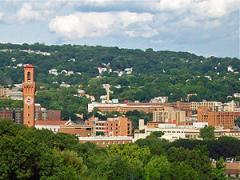

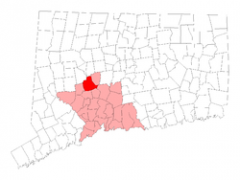
Waterbury (nicknamed the "Brass City") is a city in New Haven County, Connecticut, on the Naugatuck River, 33 miles (53 km) southwest of Hartford and 77 miles (124 km) northeast of New York City. As of the 2010 census, the city had a total population of 110,366 and is the ninth largest city in New England, the fifth-largest city in Connecticut and the second largest city in New Haven County.
Throughout the first half of the 20th century Waterbury had large industrial interests and was the leading center in the United States for the manufacture of brassware (including castings and finishings), as reflected in the nickname the "Brass City" and the city's motto Quid Aere Perennius? ("What Is More Lasting Than Brass?"), which echoes the Latin of Horace's Ode 3.30. It was noted for the manufacture of watches and clocks.
The city is located along Interstate 84 and has a Metro-North railroad station. It is also home to Post University and a regional campus of the University of Connecticut.
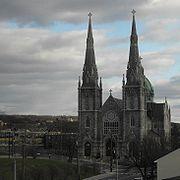
The original settlement of Waterbury was in 1674 as a Town Plot section. In 1675 King Philip's War caused it to be vacated but the land, was returned to in 1677, this time west of the first settlement. Both sites are now marked. The Algonquin name for the area was "Matetacoke", meaning "place without trees." Thus the settlement was named "Mattatock" in 1673. The name changed to Waterbury on May 15, 1686, when the settlement was admitted as the 28th town in the Connecticut Colony. It then included all or parts of the later towns of Watertown, Plymouth, Wolcott, Prospect, Naugatuck, Thomaston, and Middlebury. The name Waterbury was chosen because of all the streams flowing into the Naugatuck River. Growth was slow during Waterbury's first hundred years. The lack of arable land discouraged new settlers, and the residents suffered through the great flood of 1691 and the great sickness of 1712. After a century, Waterbury's population numbered just 5,000.
Waterbury hit its stride as an industrial power in the early 19th century when it began to manufacture brass. The new brass industry in this small city attracted many workers from all over the world, leading to an influx of immigrants from every nationality. As the "Brass Capital of the World", the city gained a reputation for the quality and durability of its goods. Waterbury was incorporated as a city in 1853. Waterbury supplied brass and copper used in Boulder Dam in Nevada. Waterbury brass was used for many other things in the United States such as minting disks for nickels, but the brass also went into South American coins.
Another famous Waterbury product of the mid-19th century was Robert H. Ingersoll's one-dollar pocket watch, five million of which were sold. After this, the clock industry became as important as Waterbury's famed brass industry. Evidence of these two important industries can still be seen in Waterbury, as numerous clocktowers and old brass factories have become landmarks of the city.
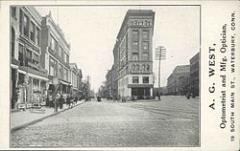
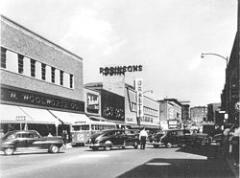
At its peak during World War II, 10,000 people worked at the Scovill Manufacturing Co, later sold to Century Brass. The city's metal manufacturing mills (Scovill Manufacturing, Anaconda American Brass, and Chase Brass & Copper were the largest) occupied more than 2 million square feet (180,000 m ²) and more than 90 buildings.
According to the United States Census Bureau, the city has a total area of 29.0 square miles (75.0 km2), of which 28.5 square miles (73.9 km2) is land and 0.42 square miles (1.1 km2), or 1.46%, is water.
Waterbury lies in the humid continental climate zone, and normally sees cold, snowy winters and warm, humid summers.
As of the census of 2010, there were 110,366 people, 42,761 households, and 26,996 families residing in the city. The population density was 3,866 people per square mile (1,449.7/km ²). There were 42,761 housing units at an average density of 1,492.0 per square mile. The racial makeup of the city was 58.8% White, 20.1% Black or African American, 0.6% Native American, 1.8% Asian, 0.1% Pacific Islander, 14.2% from other races, and 4.6% from two or more races. Hispanic or Latino of any race were 31.2% of the population.
Waterbury is probably the most heavily Italian-American large city in Connecticut today with 18.4% of its population claiming Italian heritage in 2010. The Italian influence is especially strong in the Town Plot, Brooklyn, and North End neighborhoods. It has been said[who?] that 6 in 10 voters in Waterbury are of Italian descent, and they often prove to be a decisive voting block in city elections. Additionally, the city is home to thriving French-Canadian, Portuguese, Lebanese, Lithuanian, and Albanian communities. Waterbury has strong Irish roots as well, especially in Washington Hill, which is home to the city's annual St. Patrick Day's Parade. At the beginning of the 21st century, Waterbury had a growing Orthodox Jewish population.
There were 42,622 households out of which 31.2% had children under the age of 18 living with them, 34.7% were married couples living together, 28.4% had a single householder with no husband present, and 36.9% were non-families. 31.4% of all households were made up of individuals and 12.1% had someone living alone who was 65 years of age or older. The average household size was 2.46 and the average family size was 3.11.
In the city the population was spread out with 25.6% under the age of 18, 10.1% from 18 to 24, 27.4% from 25 to 44, 24.3% from 45 to 64, and 12.6% who were 65 years of age or older. The median age was 35.2 years. For every 100 females there were 89.9 males. For every 100 females age 18 and over, there were 85.8 males.
The median income for a household in the city was $40,254, and the median income for a family was $47,077. Males had a median income of $35,486 versus $27,428 for females. The per capita income for the city was $21,545. About 12.7% of families and 16.0% of the population were below the poverty line, including 23.6% of those under age 18 and 11.1% of those age 65 or over.
Waterbury's economic decline in the 1970s and 1980s resulted in it being ranked as having the worst quality of life of 300 U.S. metropolitan areas by Money Magazine in 1992. Waterbury was rated as one of the "10 Worst Places to Live in America" in the 1999 Places Rated Almanac. Waterbury was also rated as one of the "Worst Places for Businesses and Careers in America" by Forbes Magazine in April 2008.
According to the city's 2010 Comprehensive Annual Financial Report, the top employers in the city are:
Waterbury has about 52,000 registered voters, of whom about 24,000 are Democrats. There are about 7,800 registered Republicans and the balance are largely unaffiliated, with a smattering belonging to minor parties.
John S. Monagan, who was a prolific author in addition to his political responsibilities, served as Waterbury's mayor from 1943 to 1948. He also served as its district's congressional representative from 1959 to 1973. George Harlamon, a member of the Waterbury Hall of Fame, was the city's 40th mayor. He served from 1969 to 1970 during a period of racial tension. The city is known for its hard-nosed political culture compared locally to Cook County, Illinois, close elections, and a number of scandals. This reputation is so solidified that U.S. Senator Joseph I. Lieberman once joked that upon his death, he hoped to be buried in Waterbury so he could remain politically active.
Waterbury's scandalous past dates back to 1940 when Mayor T. Frank Hayes and 22 others were convicted of conspiracy to defraud the City of Waterbury. Hayes received a 10 ae15 year sentence and served six years. Ironically, the massive corruption scheme was exposed with the help of then comptroller Sherwood Rowland, grandfather of Gov. John G. Rowland, who was convicted on corruption charges in 2004. The recently[when?] published book, Publisher vs. Politician: A Clash of Local Titans, by author William A. Monti, is an account of the rise and fall of T. Frank Hayes and focuses on his election campaigns, his bitter fights with William J. Pape, publisher of two local newspapers, and his ultimate trial, conviction, and sentencing for corruption. Ironically, what appeared to have been a defeat for Hayes was not really a victory for Pape, and the stage was set for further corruption in Waterbury in the second half of the 20th century. Waterbury was in serious financial straits due to years of mismanagement, resulting in the city's finances being take over by the State of Connecticut. The State Oversight Board oversaw city business for several years and have since left following consecutive years of balanced budgets. The successors to Philip Giordano, former Acting Mayor Sam Caligiuri (2001) and former mayor Michael Jarjura (2001 ae2011) managed the city without major controversy since 2001. Democrat Neil O'Leary was elected the 46th Mayor of Waterbury on November 9, 2011.
A number of presidential candidates have campaigned in Waterbury due to its pivotal role in statewide elections. The most famous was the election eve visit on the Green by John F. Kennedy in 1960. Forty thousand people waited until 3 am on the Green to greet Kennedy on Sunday, November 6, 1960. Sen. Kennedy spoke to them from the balcony of the Roger Smith Hotel (now called the Elton). Pierre Salinger later said it was the greatest night of the campaign. In September 1984 Ronald Reagan held a huge noontime election rally at the same location. In July 2006 former President Bill Clinton made a campaign appearance at the Palace Theatre for Senator Joe Lieberman during his campaign for re-election to the U.S. Senate. Shortly after the Democratic primary, Tom Swan, campaign manager for Lieberman's opponent Ned Lamont, described Waterbury as a place where "the forces of slime meet the forces of evil," after a large majority of the town's voters backed Lieberman. Swan claimed he was referring to former Mayor Philip A. Giordano and former Governor John G. Rowland.
Governor John G. Rowland served ten months in a federal prison until February 10, 2006. He was released from federal prison with the stipulation that he serve four months house arrest with an electronic ankle bracelet monitor until June 2006.
In January 2008 Waterbury Mayor Michael Jarjura announced that he would hire Rowland as a economic development advisor for the city. Rowland began work in February and is receiving an annual salary of $95,000 as the city's economic development coordinator.
Waterbury is home to Connecticut's Consulate General of Portugal, which has its office downtown on East Main Street.
The city's schools are operated by Waterbury Public Schools under the leadership of superintendent Dr. Kathleen Ouellette and a board of education that consists of ten elected members and the city mayor, who acts as the chairman ex-officio.
Karen E. Harvey (D-Vice President)
Public high schools:
Private schools:
Waterbury has a number of Catholic elementary schools, including Our Lady of Mt. Carmel, St. Mary's, Blessed Sacrament, and Sts. Peter & Paul.
The Yeshiva Gedolah School of Waterbury provides Orthodox Jewish education from kindergarten to post-high school students. It is operated by the Yeshiva Community of Waterbury.
Christian schools in Waterbury include Lighthouse Christian Academy, Waterbury Christian Academy, and Alpha & Omega Academy.
Waterbury is home to Post University, a private liberal arts college, and to Naugatuck Valley Community College.
The city of Waterbury is protected by the paid, full-time firefighters of the Waterbury Fire Department (WFD). The department currently operates out of eight fire stations located throughout the city, under the command of a Battalion Chief and a Deputy Chief. The Waterbury Fire Department operates and maintains a fire apparatus fleet of eight engines, three trucks, one rescue, one HazMat unit, one collapse unit, one foam unit, and many other special, support, and reserve units. The WFD responds to approximately 18,000 emergency calls annually. The current chief of department is David Martin.
Below is a complete listing of all fire station locations and apparatus in the city of Waterbury.
The Waterbury Police Department (WPD) was founded in 1853. Headquarters is at 255 East Main Street, while the Waterbury police academy is located at the Waterbury Police Department Annex at 240 Bank Street. The 2010 force is composed of 300 officers, and the current chief of police is Michael Gugliotti.
Waterbury is a city of neighborhoods. Their distinctive character, shaped by the history and geography of the city, has led residents to form an unusual loyalty to their neighborhood.
Vibrant ethnic communities distinguished the city neighborhoods. Clusters of shops at the street corners offered neighborhood residents everything they could desire, creating villages within the city. For many people, home, work and community life was contained within their neighborhood. Downtown, a short walk away, was "the city", offering live theater, fancy stores, parades and spectacles.
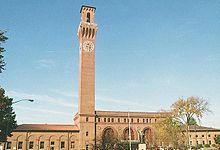
Constructed by the world-famous architectural firm of McKim, Mead & White of New York for the New York, New Haven and Hartford Railroad Company, the Union Station on Meadow Street was modeled after the Torre del Mangia at the Palazzo Pubblico in Siena, Italy. It cost $332,000 to build in 1909. The clocktower is 240 feet (73 m) high and has 318 steps. The clock was made by Seth Thomas Co. with a dial 16 feet (4.9 m) in diameter with 5-foot (1.5 m) tall Roman numerals. The eight she-wolf gargoyles are a reminder of the myth of Romulus and Remus. The tower opened July 12, 1909. Union Station is now the home of the Waterbury Republican-American newspaper, and the city's Metro-North railroad station is on a platform next to the building.
The stadium was built in 1930 originally as a dog track which explains its unique, if not odd, layout. It holds 6,000 people. It is somewhat unique in that it only has permanent stands along the first-base line, while bleachers lie along the third-base side.
It was home to minor league baseball for the majority of its existence, beginning in 1947 with the Colonial League and from 1966 to 1986 with the AA Eastern League as an affiliate of the Dodgers, Reds, Giants, Indians, Pirates, A's, and Angels.
In 1997 the stadium became home to the Waterbury Spirit which spent four seasons in the Independent League.
Several future major leaguers played at the stadium, including Bobby Bonds, Paul O'Neill, Wally Joyner, Cory Snyder, and Danny Tartabull.
It is now used for sporting events, primarily football and baseball, for most of the city's high schools and Little Leagues.
The stadium has been home to a few historic events. Woman's softball pitcher Joan Joyce struck out Ted Williams, Dom DiMaggio, and Johnny Pesky in order in the stadium, and in 1947 several members of the New York Yankees including Joe DiMaggio, Yogi Berra, Phil Rizzuto, and Spec Shea, played an exhibition game against the Waterbury Timers in the stadium.
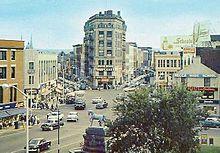
The Apothecary Building, the focal point of Exchange Place in the center of Waterbury at the intersection of South Main and Bank streets, was built in 1893 and housed the Apothecaries Hall Pharmacy for over 70 years.
The 2,500-pound (1,100 kg) statue on the Carrie Welton Fountain on the east end of the Green is in memory of Caroline Josephine Welton's black stallion, Knight, and her love of animals. The fountain was dedicated November 10, 1888.
Sculpted by former Waterbury resident George C. Bissell as a tribute to the whole Civil War experience, the 48-foot-high (15 m) bronze Soldiers' Monument on the west end of the Green was cast in Paris and cost $25,000. It was dedicated October 23, 1884. Other Bissell works include the Memorial to Scottish American soldiers of the Civil War located in Edinburgh, Scotland, and many statues in Riverside Cemetery, including one of Waterbury Civil War hero, Col. John L. Chatfield. The poem on the Soldiers Monument, by Dr. Joseph Anderson of Waterbury history fame, was included in the Library of American Literature:
Brave men, who rallying at your country's call
Designed by Luis Fucito for the City of Waterbury for about $55,000, it was intended in honor of all those who have served in the wars of the United States. The 15-foot (4.6 m) star was dedicated on May 30, 1958, and is located on the west end of the Green.
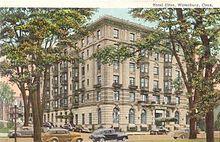
Built in 1905, the Elton Hotel on the Waterbury Green was a grand hotel which served as the starting point for the "Ideal Tour". Created by the Elton's first manager, Almon Judd, this tour created a convoy of early automobiles which journeyed to New England resorts. The Elton was considered one of New England's most elegant hotels until the 1960s, when it became the Roger Smith Hotel. It is now an assisted living facility. President John F. Kennedy made a campaign speech from the balcony of the hotel on Sunday, November 6, 1960. Forty thousand people waited until 3 am on the Green to greet then Senator John F. Kennedy who spoke to them from the balcony of the hotel. A plaque was later added to the building to commemorate the occasion. Also on the building is a plaque commemorating the establishment of Unico National in the city in 1922.
Nationally renowned architect Cass Gilbert won a competition to design Waterbury's City Hall building on Grand Street, which was completed in 1915. Gilbert was then hired to design the Chase Headquarters Building (facing City Hall and now a municipal building housing the mayor's office); a bank building next to City Hall; the Lincoln House and the Chase Dispensary buildings on Field Street; and the Waterbury Club on West Main Street (demolished in the 1960s); and coordinated the landscaping of Library Park with the Olmsted Brothers in the 1920s.
The statue was completed by sculptor Frank Gaylord of Barre, Vermont, for the Christopher Columbus Committee and the Waterbury Unico National Club at a total cost of $45,000, $25,000 for the statue and $20,000 for the base. The 12-foot (3.7 m) Christopher Columbus statue is made of granite and weighs 12,000 pounds (5,400 kg). Standing in front of City Hall, this statue was dedicated October 12, 1984. The Christopher Columbus Time Capsule, closed October 12, 1992 to be opened October 12, 2092, is behind the monument.
The base of the sculpture reads:
Cristoforo Columbo
The Ben Franklin statue seated in front of the Silas Bronson Library on Grand Street was designed by renowned sculptor Paul Wayland Bartlett, a one-time Waterbury resident. The 1,700-pound (770 kg) statue was made possible by a $15,000 donation from Elisha Leavenworth. After completion, it made a 22-city tour, with celebrations in each city, from Baltimore to Boston and then to Waterbury where it was dedicated June 3, 1921.
The Waterbury Courthouse on the corner of Grand and Meadow streets, with its graceful curved facade and brass-bedecked entranceway, was the headquarters of the Anaconda American Brass Company for over 50 years. A large addition was put on the building in 1998.
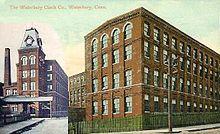
The Waterbury Clock Company buildings on Cherry Avenue were constructed in 1857. By the end of the 19th century, the company employed 3,000 workers and turned out 20,000 clocks and watches a day. The Great Depression sent the Waterbury Clock Co. into receivership, and the company was eventually purchased by Thomas Olsen (owner and operator of Fred. Olsen Shipping Co.) and Joakim Lehmkuhl of Norway during World War II to aid in the war effort, becoming the largest producer of fuse timers for precision defense products in the United States. The company was renamed the United States Time Corporation in 1944 following its wartime success. Manufacturing operations here ceased when production was moved to a new factory in Middlebury, Connecticut, in 1942, and the buildings now house several small businesses. The company still operates today as Timex Group USA, maintaining its headquarters in Middlebury.
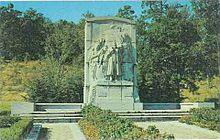
The 175 ton, 60-foot-long (18 m) Harrub Pilgrim Memorial was carved out of French granite by Hermon Atkins MacNeil of New York. Charles Harrub, an engineer for the American Brass Company, donated the $100,000 needed for the project to honor his wife and the Pilgrims. Dedicated October 11, 1930, at its original location at the entrance to Chase Park across from the Freight Street bridge, it was moved for the construction of the Interstate Route 84 / Route 8 interchange and is now located at the corner of Highland Avenue and Chase Parkway.
Chief Two Moon Meridas built his laboratory building on East Main Street in 1925 and manufactured his world famous herbal medications there until his death in 1933. The Indian Heads and two moons engraved on the front exterior walls have been retained on the building.
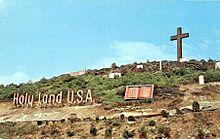
Holy Land USA was an 18-acre (73,000 m2) park in Waterbury, representing a miniature Jerusalem and Bethlehem. It was one of Connecticut's biggest tourist attractions in the 1960s and 1970s, with 50,000 visitors per year. Holy Land USA was built in the 1950s by local attorney John Baptist Greco. The 50-foot (15 m) cross was designed and built by Frank Veto Lyman. This steel cross was once lit up purple for Lent and red for the Christmas season. Holy Land USA closed in 1984, and the plaster, wire caves and structures are now in miserable shape. Some local residents wish to see the place restored, while others want it razed and turned into a park.
On November 20, 2002, Comedy Central's The Daily Show with Jon Stewart spoofed Holy Land in a segment with correspondent Stephen Colbert satirically comparing the park to Israel.
The cross was one of Waterbury's most beloved and prominent landmarks. Illuminated at night, it was a beacon seen from many homes and thousands of motorists passing daily on highways below. Pilots even used it for orientation.
In April 2008, workmen took down the former cross, which had become unstable from years of weathering and repeated attacks by vandals. The Religious Teachers Filippini, an order of nuns that owns the property, paid $250,000 to have it replaced with a cross that is a little shorter, a bit thinner, but more durable. In addition, the cross is not illuminated like the previous ones, but instead is lit by surrounding floodlights.
On June 18, 2008, the new 50-foot (15 m) cross was blessed and rededicated by Archbishop Henry J. Mansell. The new cross is actually the third giant cross to grace the site. The original was 32 feet (9.8 m) tall and was erected in 1956. The cross was dedicated to world peace in a ceremony attended by 1,200 people in November of that year. It was the beginning of Holy Land.
That original cross was replaced in 1968, by a cross of steel girders and plastic that housed fluorescent lights that reached 56 feet (17 m) into the sky. That cross was dedicated to peace and also to the slain John and Robert Kennedy.
Today, much of what was Holy Land is in ruins. Broken pavement lines the road winding through the property. Yellow tape blocks access to displays, many of which have been smashed by vandals. While the site is officially off-limits, people still skirt no-trespassing signs to visit.
The Mattatuck Museum Arts and History Center is the only museum in Connecticut dedicated to collecting and exhibiting Connecticut artists and sculptors. Previously housed in the historic Kendrick House on the other side of the Green, the museum moved to the former Masonic Temple in 1986. The renovation and construction was designed by noted Argentine-born architect Cesar Pelli. Exhibits in the ground floor galleries reveal the history of Waterbury and surrounding towns. New additions to the history exhibit include an interactive display about the region's slavery history. Recent additions to the art collections include a gallery display about Alexander Calder and a "Giant Critter" designed by Calder in the museum's courtyard.
Another educational landmark of Waterbury is the Timexpo Museum. The museum, which is in what were formerly factory buildings of the Scovill Manufacturing Company, opened to the public in May 2001. There are three floors of exhibits that explore the heritage of the world-famous Timex Group, tracing back to its early days as the Waterbury Clock Company. Visitors can witness the birth and growth of Timex, enjoying demonstrations of the inner workings of clock and watches. Within the museum there are a variety of hands on exhibits with craft activities, and computer interactions.
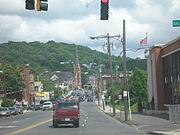
Before the Brass Mill Center Mall was built, the Naugatuck Valley Shopping Mall was the main shopping center of the area. It was located on Wolcott Street and built in August 1969. The Naugatuck Valley Mall first opened with an interior movie theater and two well-known anchors in the Connecticut area: Sears and G. Fox.
The Brass Mill Center & Commons is a shopping venue built on the site of old Scovill Manufacturing Co. factory buildings near the center of Waterbury. It houses many stores and restaurants including Old Navy, American Eagle, Hollister Co., Barnes & Noble, Chili's, IHOP, Bertucci's, Macy aos, JCPenney, Sears, Burlington Coat Factory.
Originally opened in 1922, the Palace Theatre was home to films and vaudeville shows. It operated for nearly seventy years before being closed in 1987. Thanks to the financial backing of the State of Connecticut and the support of then-Governor Rowland, the theatre reopened on November 12, 2004.
The Chase Collegiate School is a private day school formerly known as Saint Margaret's-McTernan established in 1865 by Chase Brass and Copper Company.
The oldest store in downtown Waterbury closed in late 2009. Minicucci's was owned by Arnold Minicucci who inherited the store from his father, Erasamo Minicucci. The store was founded in the early 20th century and was located on Bank Street.
Word Count: 5116






